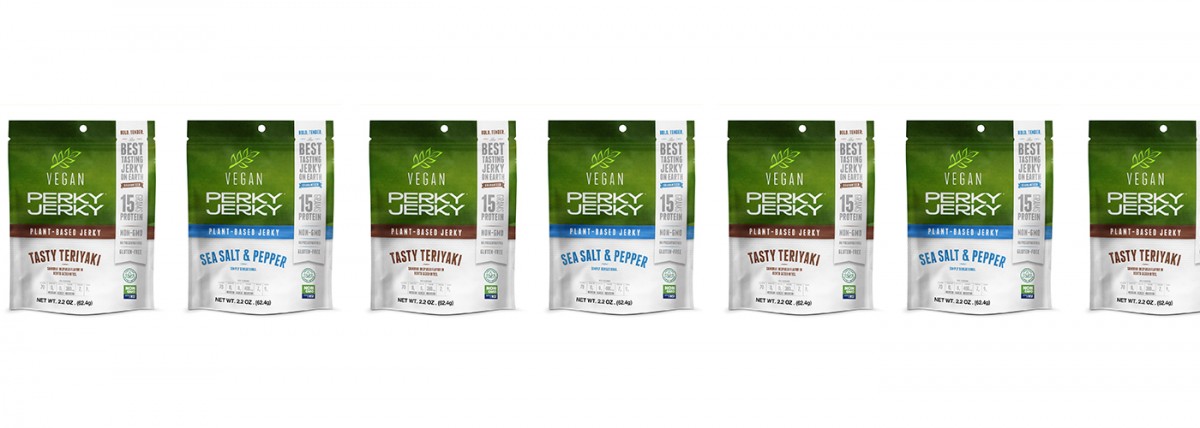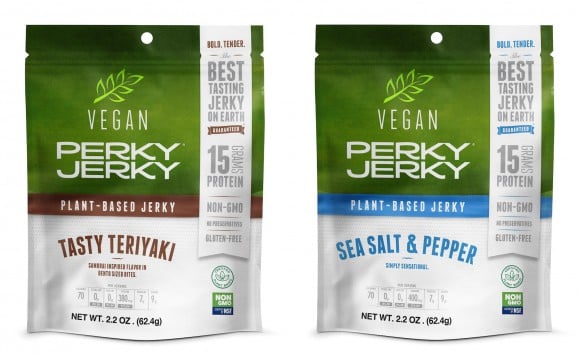Plant-based jerky is a meaty opportunity

Manufacturers, investors, retailers, and customers, take note: While bleeding patties are still sizzling in the headlines, another promising favorite is on the rise in the plant-based world. Whether catering to those who love conventional meat or to those who avoid it, a number of notable snack brands are now offering jerky made from plants!
“Burgers get a lot of attention, but every meat category is ripe for plant-based disruption,” said GFI foodservice analyst Zak Weston. “Meat snacks are a growing trend as consumers move toward convenience and getting their protein on the go. Plant-based jerky is well-positioned to benefit from the same trends boosting animal-based jerky, with the added benefit of being a great source of plant-based protein.”
As the plant-based food sector flourishes and demand continues to climb throughout the United States, the jerky category is just starting to develop. According to Nielsen, jerky from plants pulled in $2.5 million in revenue in the year ending in August 2018—only a sliver of the $1.5 billion animal jerky brought in during that period. Snack makers are venturing into this space to bridge the gap.
Improved Nature releases their jerky 2.0
Improved Nature, a plant-based protein startup out of Raleigh, North Carolina, launched a pair of jerky options this month in collaboration with the meat snack producer Perky Jerky. Vegetarians, flexitarians, and meat enthusiasts can find them in stores across the country to experience their robust textures and flavors in either Tasty Teriyaki or Sea Salt and Pepper.

“We are very excited to partner with Perky Jerky for this new product line because they already have an excellent reputation in the industry,” said Improved Nature president and CEO Dr. Rody Hawkins in a press statement. “Together, we have been able to produce a delicious plant-based protein jerky product that will satisfy even the most discerning jerky eater. The best part—our products are not only good for you, but they’re also good for the planet.”

Established in 2015, Improved Nature aims to create yummy, chewy protein with a few simple plant ingredients to offset the mounting environmental and societal consequences of global population growth.
Krave wants in on plant-based jerky
The gourmet meat company Krave has announced that they, too, are putting out plant-forward jerky choices in late 2019. Crafted using peas and fava beans, their jerky provides a no-cholesterol alternative to regular jerky.
A subsidiary of Hershey’s Amplify Snack Brands headquartered in Austin, Texas, Krave is a decade-old enterprise. They were a sponsor and exhibitor at the recent Good Food Conference, where we were thrilled to sample their Smoked Chipotle and Korean BBQ pilot jerkies.
“GFI is excited to see new plant-based jerky products from startups like Improved Nature and snacking giants like Hershey entering this category,” Weston said. “Hershey can leverage its existing snacking expertise and partnerships to instantly get Krave’s new plant-based jerky in front of millions of consumers, which will hopefully drive increased visibility for the entire plant-based jerky category.”
Plant-based jerky shows plenty of potential
Sales of traditional meat snacks have grown over 7 percent annually from 2013 to 2018. But the growth of animal-free jerky far outpaced this last year, with sales jumping almost 60 percent since 2017.
America’s plant-derived jerky market hit $3.9 million for the year ending this past April, according to SPINS data commissioned by GFI. As flexitarian cravings reach the snack aisle, the plant-based jerky industry is ready for further development, investment, and expansion.
A handful of plant jerkies, such as Stonewall’s Jerquee, Louisville Vegan Jerky, and Primal Strips, have been available for several years. Unlike their animal-based counterparts, though, they’re not stocked by most supermarkets and not always easily accessed by shoppers. As more grocers carry the widening array of plant-focused jerky, and snackers keep seeking it out, jerky could become the next big thing in plant-based news!
About the data

The data summarized here represents U.S. retail sales of plant-based foods that directly replace animal products, including meat, seafood, eggs, and dairy, as well as meals that contain animal ingredient replacements. This data covers the grocery marketplace and was obtained over the 52-week and 104-week periods ending December 29, 2019, from the SPINSscan Natural, Specialty Gourmet, and Conventional Multi Outlet (powered by IRI) channels. The data is based on custom-GFI plant-based categories that were created by refining standard SPINS categories. Due to the custom nature of these categories, the presented data does not align with standard SPINS categories.
1,2 The Food Industry Association & IRI. (2020). Understanding the plant-based food consumer [Webinar].
*Note: SPINS does not report non-UPC meat counter sales. To account for this, the plant-based meat total retail share calculation uses the $95 billion total meat market size reported by Nielsen, as this number includes both retail packaged meat sales and non-UPC meat counter sales.

